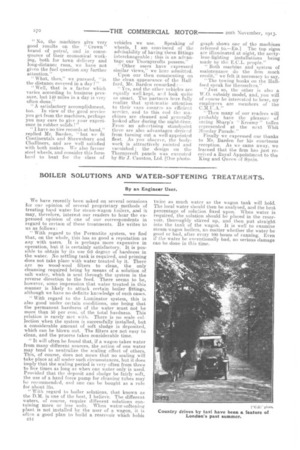BOILER SOLUTIONS AND WATER – SOFTENING TREATMENTS.
Page 16

If you've noticed an error in this article please click here to report it so we can fix it.
By an Engineer User, We have recently been asked on several occasions for our opinion of several proprietary methods of treating hard water for steam-wagon boilers, and it may, therefore, interest our readers to hear the expressed opinion of one of our correspondents in regard to certain of these treatments. Ile writes to us as follows: "With regard to the Permutite system, we find that, on the whole, this has as good a reputation as any with users. It is perhaps more expensive in operation, but it is certainly satisfactory. It is possible to obtain by its use 0.0 degree of hardness in the water. No settling tank is required, and priming does not take place with: water treated by it. There are no wood-wool filters to clean, the only cleansing required being by means of a solution of salt water, which is sent through the system in the reverse direction to the feed. There seems to be, however, some impression that water treated in this manner is likely to attack certain boiler fittings, although we have no definite knowledge of such cases.
"With regard to the Luminator system, this is also good under certain conditions, one being that the permanent hardness of the water must not be more than 50 per cent. of the total hardness. This relation is rarely met with. There is no scale collection when the system is successfully installed, but a considerable amount of soft sludge is deposited, which can be blown out. The filters are not easy to clean, and the process takes considerable time.
" It will often be found that, if a wagon takes water from many different sources, the action of one water may tend to neutralize the sealing effect of others. This, of course, does not mean that no sealing will take place at all under such circumstances, but it does imply that the scaling period is very often from three to five times as long as when one water only is used. Provided that the deposit and sludge be fairly soft, the use of a hand force pump for cleaning tubes may he reeommended, and one can be bought as a rule for about 35s.
" With regard to boiler solutions, that known as the D.M. is one of the hest, I believe. The different waters, of course, require different solutions containing more or less soda. When water-softening plant is not installed by the user of a wagon, it is often a; good plan to build a reservoir which holds c14 twice as much water as the wagon tank will hold. The local water should then be analysed, and the best percentage of solution fixed upon. When water is required, the solution should be placed in the reservoir, thoroughly stirred up, and then put straight into the tank of the wagon. It is well to examine steam-wagon boilers, no matter whether the water be good or bad, after every 100 hours of running. Even if the water he exeentionally bad, no serious damage can be done in this time.






















